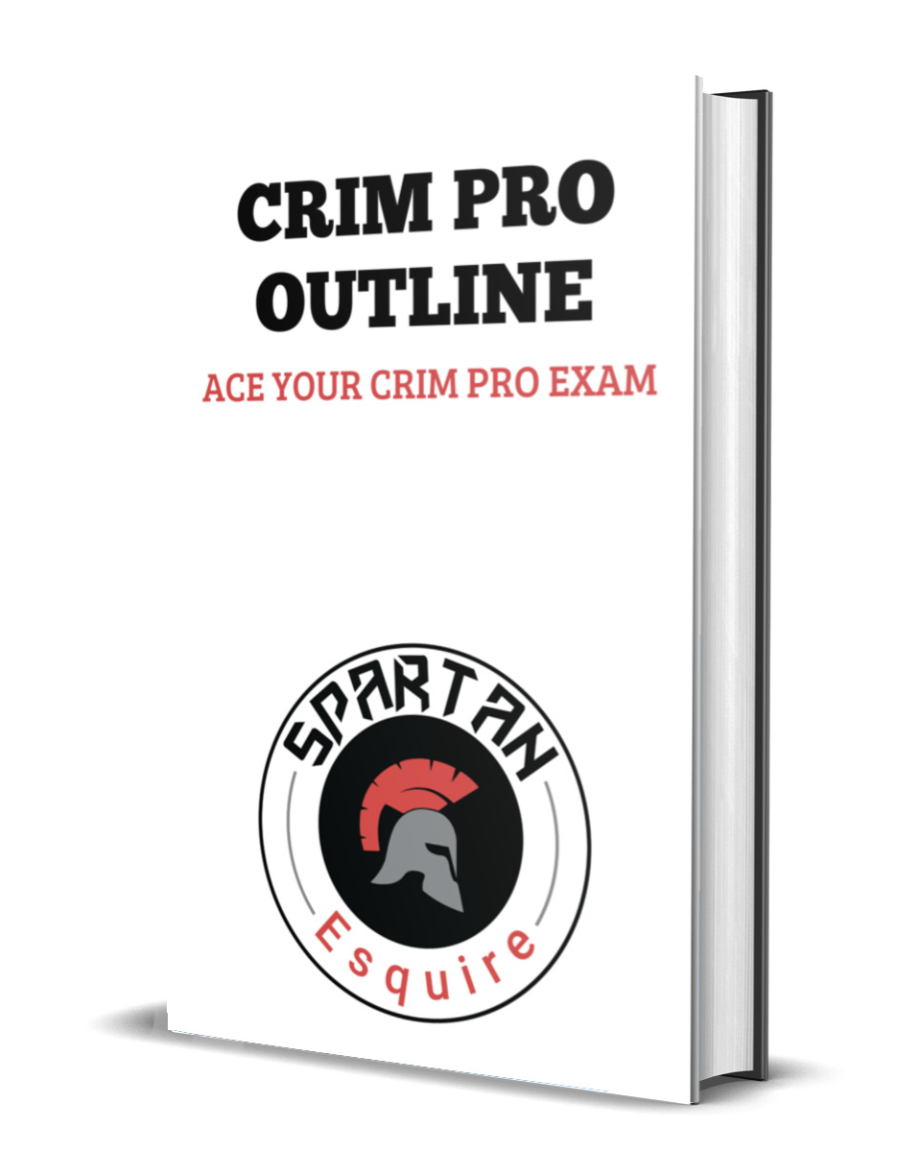
Criminal Procedure can be one of the hardest law school classes, but it doesn’t have to be. In fact, there’s a simple way to master Criminal Procedure I and II that your Crim Pro professor won’t teach you. But I will. Hi I’m JD, a BigLaw attorney. I aced my Criminal Procedure exams by studying smart (not hard) and creating an actionable outline tailored specifically to what Crim Pro professors want to see on the final exam. Read on to learn why you need to download my proven Criminal Procedure outline today.
Ace Your Crim Pro Exams With The Best Criminal Procedure Outline
So you want to ace your Criminal Procedure exams. Right?
Perfect.
Here’s what you need to know. My Criminal Procedure outline covers Crim Pro I and II and consists of two easy-to-read sections designed specifically to help you ace your exams.
The first section features a comprehensive summary of the law, rules, and exceptions you need to know to ace your Crim Pro exams. This section will serve as a roadmap for your Criminal Procedure classes throughout the semester.
The second section is what I call an “attack outline.” It’s a condensed Criminal Procedure checklist designed to guide you through even the toughest exam questions your professor can dream up.
So I ask you this simple question, “Wouldn’t you pay a few bucks for a tool that will help you ace your Criminal Procedure exams?”
I thought so.
Then take the first step to crushing your Crim Pro exams. Download my proven Criminal Procedure outline today.
My entire 50-page Criminal Procedure outline is now available as a printable PDF e-book for only $19.99. That’s cheaper than a few cups of your morning coffee.
Invest in your law school career by making your Criminal Procedure classes a lot easier. Click the book now to get your copy of my best-selling Crim Pro outline because I’m going to stop selling it soon.
And because I want you all to ace your Criminal Procedure exam, I’m giving away a free copy of my Criminal Procedure Attack Outline. Go ahead and cut/paste this outline and use it on test day.
Confessions
Due Process Clause/Totality of Circumstances Test
- Did the interrogation overbear the will of the suspect under the totality of circumstances?
- If yes, all statements/fruits are inadmissible in the prosecution’s case in chief and for impeachment.
Miranda Test
- Was there custody + interrogation?
- Were the warnings adequate?
- Was there a valid waiver (i.e., voluntarily, knowingly, intelligently)?
- Did the suspect invoke his right to counsel, or right to remain silent?
- Do any exceptions apply?
- Are there any testimonial or physical fruits regarding the case in chief or impeachment?
Sixth Amendment Test
- Did the suspects right to counsel attach (i.e., criminal adversarial proceed + critical stage)?
- Did the police deliberately elicit incriminating information from the suspect without a lawyer present?
- Was there a valid waiver?
- Are there any testimonial fruits regarding the case in chief or impeachment?
Lineups, Showups, & Identification Procedures
14th Amendment/Due Process Clause Standard
- Applies to photo identification & corporeal identification procedures (both pre-indictment and post-indictment).
- Was the out of court identification of the defendant, under the totality of circumstances: (1) unnecessarily suggestive; and (2) conductive to mistaken identification?
- If yes, excluded at trial (hard standard to meet).
6th Amendment Standard
- Applies only to post-indictment corporeal procedures.
- Criminal adversarial proceedings + critical stage analysis.
- Was the attorney present?
- Was there a valid waiver?
- If denied counsel at lineup/showup, prosecutor cannot obtain in-court identification of the accused by the witness, unless the prosecutor proves by clear and convincing evidence that the in-court identification is not a fruit of the tainted out of court identification.
Search & Seizure
- Has there been government conduct?
- Was there a search that violated an individual’s reasonable expectation of privacy?
- Was there probable cause and/or a warrant?
- Was the warrant complied with?
- Was there an exception to the warrant requirement?
- If there was a violation, does the exclusionary rule apply?
- Are there any fruits?
All the best,
JD
